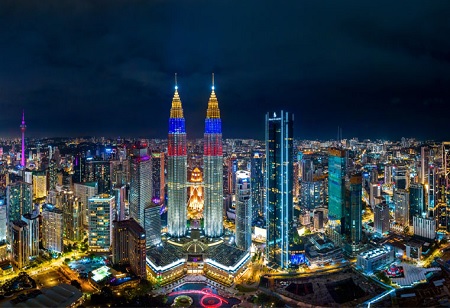
Malaysia Targets High-Tech Status by 2030, Aims to Lead in ICT

 Malaysia is on track to solidify its position as a regional powerhouse in information and communication technology (ICT), aiming to achieve high-technology status by 2030 under the New Industrial Master Plan. The ICT sector has emerged as a cornerstone of Malaysia's economic strategy, contributing significantly to GDP with a projected growth to 25.5% by 2025.
Malaysia is on track to solidify its position as a regional powerhouse in information and communication technology (ICT), aiming to achieve high-technology status by 2030 under the New Industrial Master Plan. The ICT sector has emerged as a cornerstone of Malaysia's economic strategy, contributing significantly to GDP with a projected growth to 25.5% by 2025.
In 2021, ICT accounted for 23.2% of Malaysia's GDP, showcasing robust annual growth despite global economic fluctuations. The country's IT services market, valued at USD 2.64 billion in 2023, demonstrates resilience with a forecasted CAGR of 5.9% through 2028. This sector encompasses vital areas such as software development, cybersecurity, and cloud services, serving diverse industries from finance to manufacturing.
Fusionex exemplifies Malaysia's ICT prowess, renowned for its expertise in big data analytics and AI. Collaborations with global giants like Alibaba Cloud highlight Malaysia's capability to produce world-class IT solutions providers, enhancing its appeal as a regional IT hub. Malaysia's strategic geographical location and cost-effective IT services have made it a preferred outsourcing destination within ASEAN. Its integration of IT services into manufacturing processes further bolsters its global economic footprint, supporting multinational operations like Intel and Samsung.
The country's ICT sector growth is evident across Project-Oriented Services, Managed Services, and Support Services, reflecting varied infrastructure and operational needs. Initiatives like Huawei's OpenLab in Malaysia promote regional digital transformation, fostering innovation and collaboration among local and regional businesses. Infrastructure developments such as the Asia-Africa-Europe-1 undersea cable enhance Malaysia's regional connectivity, facilitating global trade and economic integration. Partnerships like Celcom and Allo's collaboration underscore Malaysia's commitment to smart city initiatives and digital infrastructure enhancement.
Malaysia's National Digital Network (JENDELA) program aims to upgrade broadband infrastructure, positioning the nation as a regional digital hub. Initiatives like AWS and CelcomDigi's GenAI solutions and advancements in 5G technology with Huawei and Maxis further solidify Malaysia's leadership in regional communications technology.
Smart city initiatives in Kuala Lumpur, Kota Kinabalu, and Johor Bahru highlight Malaysia's focus on sustainable urban development and IoT integration. Telekom Malaysia's plans for a 40 MW hyperscale data center enhance Malaysia's status as a data hub, attracting global businesses and reinforcing its ICT leadership in the region. With ongoing digitalization efforts and ambitious infrastructure projects, Malaysia is poised for substantial growth and regional influence in Southeast Asia's digital landscape. Its proactive approach towards technological advancement sets the stage for Malaysia to play a pivotal role in the region's digital future.

